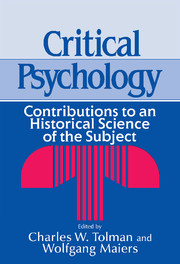Book contents
- Frontmatter
- Contents
- Preface
- Acknowledgments
- Contributors
- Critical Psychology
- 1 Critical Psychology: An Overview
- 2 Critical Psychology: Historical Background and Task
- 3 Societal and Individual Life Processes
- 4 Experience of Self and Scientific Objectivity
- 5 Psychoanalysis and Marxist Psychology
- 6 Emotion, Cognition, and Action Potence
- 7 Action Potence, Education, and Psychotherapy
- 8 Personality: Self-Actualization in Social Vacuums?
- 9 The Concept of Attitude
- 10 Client Interests and Possibilities in Psychotherapy
- 11 Play and Ontogenesis
- 12 Functions of the Private Sphere in Social Movements
- Bibliography
- Index
8 - Personality: Self-Actualization in Social Vacuums?
Published online by Cambridge University Press: 21 March 2010
- Frontmatter
- Contents
- Preface
- Acknowledgments
- Contributors
- Critical Psychology
- 1 Critical Psychology: An Overview
- 2 Critical Psychology: Historical Background and Task
- 3 Societal and Individual Life Processes
- 4 Experience of Self and Scientific Objectivity
- 5 Psychoanalysis and Marxist Psychology
- 6 Emotion, Cognition, and Action Potence
- 7 Action Potence, Education, and Psychotherapy
- 8 Personality: Self-Actualization in Social Vacuums?
- 9 The Concept of Attitude
- 10 Client Interests and Possibilities in Psychotherapy
- 11 Play and Ontogenesis
- 12 Functions of the Private Sphere in Social Movements
- Bibliography
- Index
Summary
Despite its widespread use in psychology, the concept of personality is immensely problematic. This is true of both its definition, which varies from author to author, and its function, which is normally given little or no theoretical attention (cf. Holzkamp, 1985).
Personality is usually conceived as a totality of behavior, a typical “response syndrome” that has developed out of the interaction of innate and acquired individual dispositions and environmental influences and specifically mediates the effects of momentary influences on individual behavior. The concept “personality” encompasses the more or less imposed programming of behavior that lends the individual a certain degree of independence from or resistance to momentary influences. Approaches to personality in general psychology are largely concerned with the determination of “personality traits,” such as anxiety, aggression, extraversion/introversion, frustration tolerance, and so forth, and the investigation of the interplay of disposition and situation in the emergence of individual behavior (in order to influence it in desired directions through specific interventions from either the subjective or objective side). In contrast, therapeutically inclined approaches (especially psychoanalytically oriented) are mainly concerned with the subjective consequences and costs of personal fixation, that is, “character formation” resulting from adjustment to societal conditions. (“Character” is an older term for what we now call “personality.”)
To approach personality from a Marxist standpoint means more than developing just another abstract structural model using “materialist” categories like “labor” or “activity” and then holding it up to human subjects as a norm of development.
- Type
- Chapter
- Information
- Critical PsychologyContributions to an Historical Science of the Subject, pp. 160 - 179Publisher: Cambridge University PressPrint publication year: 1991
- 1
- Cited by



